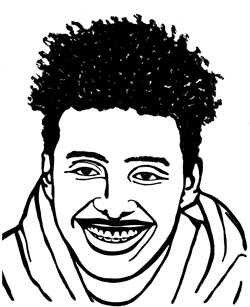Editor’s note: While School News Network prioritizes student voice in our articles, we know there is so much more to tell. We believe that to truly tell the stories that need to be told, we should first and foremost elevate students’ ideas, opinions and experiences. We want to know: What is school really like for them? What do they enjoy? What needs to change? What are issues that need to be addressed? We spoke with 10 high schoolers from seven of the districts we cover — urban, suburban and rural — to get their thoughts on what their everyday experiences are like. A topic that came up repeatedly was mental health. This is the second installment of six parts of our conversation with them. Read more from this series.
SNN: How big an issue is mental health at your school?

Liz, senior: “I think (mental health) is very stigmatized. I live in a real rural area in the middle of nowhere. And a lot of kids don’t feel comfortable talking to their parents, because it’s a town where you keep things to yourself. You don’t talk to people about things. I think if our school was to better promote school counselors or resources where you can talk about your mental health, kids will feel more comfortable going to people rather than suffering alone.”

Kelvin, sophomore: “I don’t use counselors myself, but I know friends that do and I know some people who probably should because their mental health isn’t that great. The reason why they don’t go to counselors is because … you have to fill out forms and you have to have your parent’s signature and a lot of kids don’t want their parents to get involved at all, or even hear about this at all. They want to keep it (between) them and a counselor.”

McKenna, senior: “I think most of the kids at our school know that, especially when it comes to depression or mental illness, if someone’s hurting themselves the counselor has to report it if they tell them. Some people want help, but they don’t want certain people to know and they know that if they tell this certain person then they have to tell other people. So, it’s easier to just keep it to yourself and just deal with it by yourself.
“It either feels like (schools) aren’t doing enough and they’re trying to make up for it, or they’re trying to — this is a bad term — but, like, shove it down our throats, almost. They’re like, ‘OK, here are all of the coping mechanisms. Here’s everything you need to know about mental health in an hour window.’
“I think they’re trying, but I think they don’t typically ask students what we need.”

Kaymin, junior: “I wish our school had a more widespread understanding of mental health. … I have some teachers that I would be perfectly comfortable saying, ‘Hey, my mental health is really bad.’… I got into a car accident and then I had three tests that week, and there were a couple of teachers I was comfortable (asking), ‘Hey, I just crashed my car. I’m not really doing OK, so can I get an extension?’ There were others that I was like, I don’t want to say anything. I feel like, yeah, our school has touched on mental health issues and acknowledged yes, this is a thing. But in order for something to be done, we need to do more than acknowledge it. Like, OK, that’s cool, we know it’s a thing. Now what are we gonna do? We can’t just look at it and be like, Why isn’t it getting better? But we do nothing.”

Emma, senior: “I feel like students now are much more adamant about mental health. … The administrators give their perspective … but a lot of times they don’t understand what it actually is like to struggle with your mental health as a high school student, because it’s much more of a thing now than it has been in the past. So they just show you these presentations and there’s nothing actually being done about it.”

Kerim, junior: “Mental health is something that’s really important to me. … Although every school can make improvements, I feel like the programs that we have (at my school), we are very lucky to have. … We have the Trails program; we have our counselors, we have, like, three therapists.”

Terell, junior: “Even if a kid may seem happy and everything, his life may be completely the opposite. … Sometimes you can’t know what’s going on with someone. … I’ll be honest, from last year to this year my life was really good, but then everything shifted and now everything seems bad. I can tell I’m a victim of mental health problems. … I admit I just keep chill about it because even though I know our school has those programs, I’m not so certain that they may be the best for me. I feel like, how can I go to someone and talk to them about my problems?”
Next installment: What do you wish people knew about what comes with being a high school student these days? Pressure, pressure and more pressure, our panelists say.
Thank you to The New York Times for inspiring the format for this panel, which we used to elevate the voices of students.









